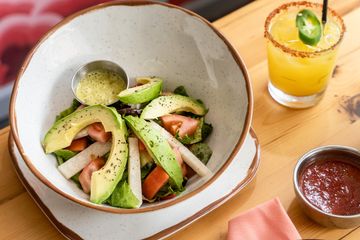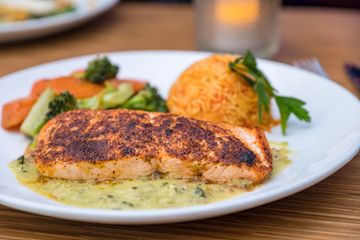Treat yourself to churros that are golden and beautifully served
Wiki Article
Is Mexican Food Healthy? Unloading the Nutritional Conveniences of Standard Components
The concern of whether Mexican food is healthy and balanced welcomes an exploration of its traditional ingredients. Beans and corn act as foundational staples, rich in protein and fiber. Avocados offer useful fats, while various natural herbs and spices include taste and health advantages - New York Times rated. With each other, these elements create a tapestry of nourishment. Nevertheless, the healthfulness of Mexican cuisine commonly relies on preparation methods and portion dimensions. What role do these elements play in establishing its overall dietary value?The Power of Beans: Protein and Fiber-Rich Staples
Although often overlooked, beans function as a keystone of Mexican food, providing a wealth of nutritional benefits. Rich in healthy protein, they are an excellent plant-based alternative for those seeking to fulfill their nutritional healthy protein requires. This high protein web content supports muscular tissue repair service and development, making beans important for both meat-eaters and vegetarians alike. Additionally, beans are an exceptional source of nutritional fiber, which assists in digestion and promotes a feeling of fullness, potentially assisting with weight monitoring.The range of beans made use of in Mexican dishes, such as black beans, pinto beans, and kidney beans, adds to a diverse flavor profile and can boost meals nutritionally. Beans are reduced in fat and contain necessary vitamins and minerals, consisting of folate, iron, and magnesium. With each other, these attributes make beans a vital active ingredient, providing both nutrition and nutrition in standard Mexican price.

Corn: a Versatile Grain With Nutritional Benefits
Corn stands out as a flexible grain basic to Mexican food, celebrated not only for its culinary applications yet additionally for its excellent dietary account. As a key ingredient in recipes like tortillas, tamales, and pozole, corn supplies essential nutrients that add to a balanced diet. Rich in carbohydrates, it functions as a considerable energy resource, while likewise being reduced in fat, making it a beneficial option for different dietary demands.Corn is a good resource of nutritional fiber, which assists in digestion and advertises satiety. It consists of significant quantities of vitamins such as B-complex vitamins, which are important for power metabolic process. The visibility of anti-oxidants, especially carotenoids, adds to total wellness by lowering oxidative tension. Additionally, corn is gluten-free, satisfying those with gluten sensitivities. In general, the nutritional benefits of corn underscore its significance in typical Mexican food and its role in a healthy diet.
Avocados: Healthy And Balanced Fats and Nutrients in Every Bite
Avocados play a considerable role in Mexican cuisine, matching meals with their creamy structure and abundant taste. Past their cooking allure, avocados are commemorated for their remarkable nutritional profile. They are a rich source of healthy and balanced monounsaturated fats, which can help lower negative cholesterol levels and support heart health and wellness. Furthermore, avocados are loaded with crucial minerals and vitamins, consisting of potassium, vitamin E, and B vitamins, contributing to total wellness.The high fiber web content in avocados aids digestion and advertises satiation, making them a valuable addition to any kind of dish. Their one-of-a-kind nutrient make-up can also support skin health and provide anti-inflammatory benefits. Including avocados into conventional Mexican meals or enjoying them as a standalone treat can boost both taste and nutrition, showing why they are a beloved staple in Mexican food. Overall, avocados provide a tasty way to enjoy healthy fats and crucial nutrients in every bite.

Natural Herbs and seasonings: Flavorful Health And Wellness Boosters
While taking pleasure in the abundant flavors of Mexican cuisine, one can not ignore the vital role that spices and natural herbs play in enhancing both taste and health. Active ingredients such as oregano, chili, and cilantro peppers not just lunch and dinner contribute to the dynamic taste profile however likewise give considerable wellness advantages. As an example, cilantro is understood for its detoxing homes, helping to remove hefty steels from the body, while oregano is loaded with anti-oxidants and possesses anti-inflammatory impacts.Chili peppers, a staple in numerous Mexican dishes, have capsaicin, which has actually been linked to boosted metabolic process and pain relief. Furthermore, seasonings like cumin and coriander assistance digestion and might aid in blood sugar level guideline. Including these flavorful health and wellness boosters right into meals not only boosts the culinary experience but additionally advertises total well-being, making Mexican cuisine not just tasty, however additionally nutritionally beneficial.
Traditional Food Preparation Methods: Enhancing Nutrition and Taste
Typical cooking techniques in Mexican food play an essential duty in enhancing both nutrition and flavor, as they often focus on fresh ingredients and time-honored methods. Methods such as nixtamalization, where corn is soaked and prepared in an alkaline solution, not only boost the nutrient account of tortillas but also enhance their digestibility - lunch and dinner. Furthermore, using slow-moving cooking methods, like stewing or braising, allows flavors to fuse perfectly while maintaining the stability of the active ingredients
Often Asked Concerns
Are Mexican Food Portions Commonly Larger Than Other Foods?
Mexican food portions are usually bigger than those of many various other foods. This characteristic mirrors conventional dining practices, stressing communal sharing and hearty dishes, which can result in an extra considerable serving dimension generally.
How Does the Preparation Approach Affect Healthiness of Mexican Food?
Preparation methods greatly affect the healthfulness of Mexican food. Strategies such as cooking or steaming preserve nutrients, while frying can raise undesirable fat material. Choices of components and cooking styles eventually figure out overall nutritional worth.Can Mexican Food Be Customized for Certain Dietary Restrictions?
Mexican food can undoubtedly be customized for certain dietary restrictions. Alternatives, such as utilizing corn tortillas for gluten-free diet regimens or integrating even more vegetables, enable people to delight in typical tastes while suiting various dietary requirements.What Prevail Misunderstandings Concerning Mexican Food and Health?
Typical misconceptions regarding Mexican food include the idea that it is inherently unhealthy, overly zesty, and entirely concentrated on fats. In truth, traditional meals usually feature nourishing ingredients and can be customized to various dietary requirements.Exist Much Healthier Choices at Mexican Restaurants?
Much healthier options at Mexican dining establishments frequently include smoked meats, beans, and fresh vegetables. Choosing meals that emphasize whole components and preventing heavy sauces can bring about an extra nutritious eating experience, advertising total health.The selection of beans used in Mexican meals, such as black beans, pinto beans, and kidney beans, contributes to a diverse taste account and can enhance dishes nutritionally. Avocados play a considerable role in Mexican cuisine, complementing meals with their luscious texture and rich taste. Including avocados into standard Mexican recipes or enjoying them as a standalone treat can enhance both taste and nourishment, demonstrating why they are a beloved staple in Mexican cuisine. While taking pleasure in the rich flavors of Mexican food, one can not neglect the essential function that spices and natural herbs play in boosting both taste and health and wellness. Conventional food preparation techniques in Mexican cuisine play an important role in enhancing both nutrition and taste, as they commonly prioritize fresh ingredients and classic methods.
Report this wiki page